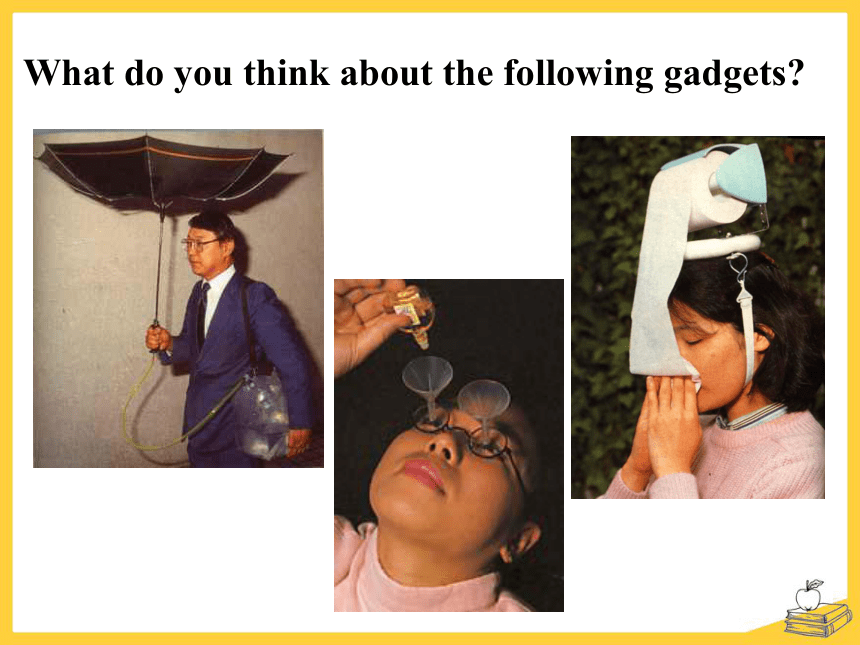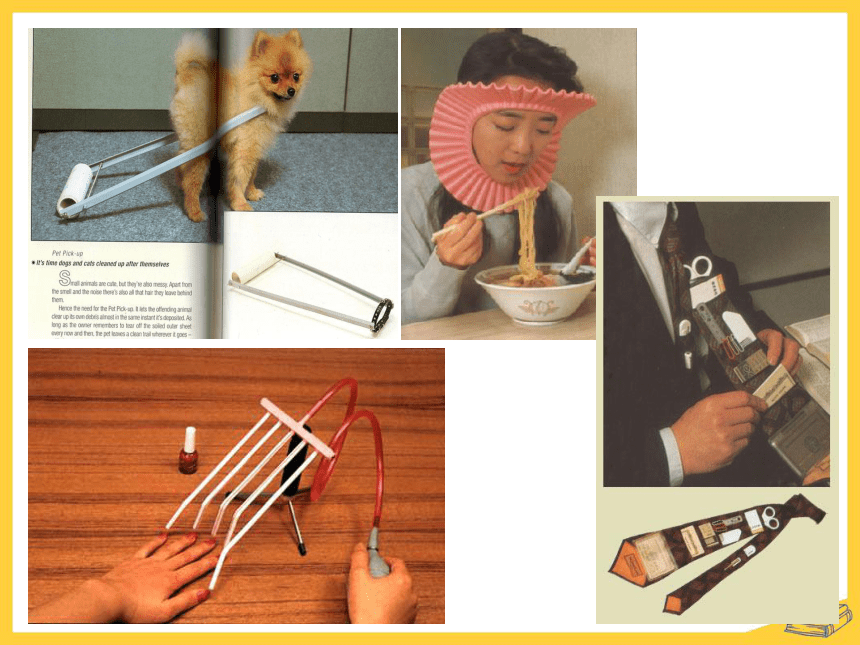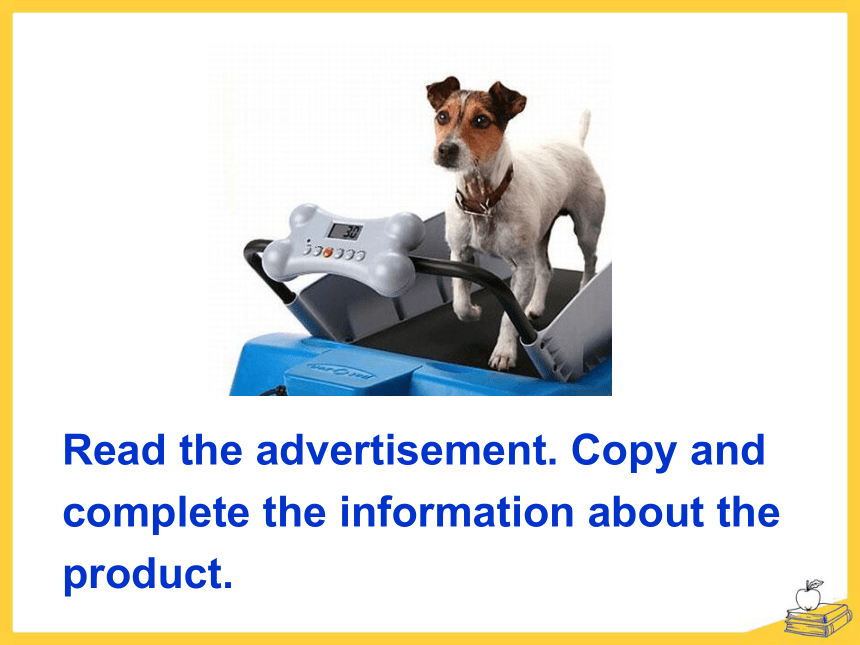英语复习北师大版必修四 Unit 10 Money Communication Workshop课件 (共19张PPT)
文档属性
| 名称 | 英语复习北师大版必修四 Unit 10 Money Communication Workshop课件 (共19张PPT) |

|
|
| 格式 | zip | ||
| 文件大小 | 2.3MB | ||
| 资源类型 | 教案 | ||
| 版本资源 | 北师大版 | ||
| 科目 | 英语 | ||
| 更新时间 | 2018-11-26 00:00:00 | ||
图片预览







文档简介
课件19张PPT。Unit 10Unit 10 MoneyCommunication WorkshopWhat do you think about the following gadgets? Read the advertisement. Copy and complete the information about the product.K9 Dogwalkerto exercise your dogat homeplasticlight, easy & convenient to take on holiday, not expensive£39.99Cantek Products1. Title
2. The problem and the solution
1) What problems does the gadget solve?
2) What does it do?
3. The advantages
give information about the design, materials, uses, convenience, etc.
4. The price / How you can get it How to write an advertisement?Speaking:
Selling your Gadget Listen to the dialogue. Complete it with the key words in the box.incredibly extremely not very quite really veryChris: Have you heard about the new dogwalker? It’s ______ great!
Jane: No, what’s that? What does it do?
Chris: Well, it’s a gadget. It takes your dog for a walk. It’s ______ convenient.
Jane: But it’s ________ useful. Have you got a picture of it?
Chris: Here it is. It’s got a brilliant design, with an _________ reliable motor – and a computer, too!reallyverynot veryextremelyJane: Why has it got a computer?
Chris: Well, you can programme the dog’s walks. And the machine’s easy to carry.
Jane: How much does it cost?
Chris: It’s only £ 39.99. That’s _____ cheap.
Jane: It isn’t. That’s __________ expensive! I’m sorry. I’m not buying it.quiteincrediblyNow make a dialogue and try to sell your gadget to other students.Listen to three sentences. Choose the correct meaning, according to the way each sentence is stressed.Listening1. The man at the back in the blue jacket.
a) not the woman b) not the front
c) not the green jacket
2. There is no doubt that it will help us to cure
all sorts of illnesses.
a) not some doubt b) not identify
c) not diseases
3. By the year 2020, over 20 percent of the
population will be over eighty.
a) not the year 2010 b) not 30 percent
c) not over 90cbb1. My watch-computer’s truly convenient!
truly adv. 真正地;准确地
e.g. Experts agreed that this was a
truly sensational performance. Language points2. Well, it’s a disk to replace our textbook.
replace是动词,意为:
①代替,取代;
②(用……)替换,(以……)接替(常用搭配:replace sb. / sth. with / by sb. / sth.);
③更换,更新;
④把……放回原处。如:She replaced her husband as the local doctor.
It is not a good idea to miss meals and replace them with snacks.
We have replaced slave labour with / by machines.
All the old curtains need replacing.
I replaced the cup carefully in the cupboard. HomeworkWork in pairs. Practise saying the same sentences but with a different stress to show the other meanings.
2. The problem and the solution
1) What problems does the gadget solve?
2) What does it do?
3. The advantages
give information about the design, materials, uses, convenience, etc.
4. The price / How you can get it How to write an advertisement?Speaking:
Selling your Gadget Listen to the dialogue. Complete it with the key words in the box.incredibly extremely not very quite really veryChris: Have you heard about the new dogwalker? It’s ______ great!
Jane: No, what’s that? What does it do?
Chris: Well, it’s a gadget. It takes your dog for a walk. It’s ______ convenient.
Jane: But it’s ________ useful. Have you got a picture of it?
Chris: Here it is. It’s got a brilliant design, with an _________ reliable motor – and a computer, too!reallyverynot veryextremelyJane: Why has it got a computer?
Chris: Well, you can programme the dog’s walks. And the machine’s easy to carry.
Jane: How much does it cost?
Chris: It’s only £ 39.99. That’s _____ cheap.
Jane: It isn’t. That’s __________ expensive! I’m sorry. I’m not buying it.quiteincrediblyNow make a dialogue and try to sell your gadget to other students.Listen to three sentences. Choose the correct meaning, according to the way each sentence is stressed.Listening1. The man at the back in the blue jacket.
a) not the woman b) not the front
c) not the green jacket
2. There is no doubt that it will help us to cure
all sorts of illnesses.
a) not some doubt b) not identify
c) not diseases
3. By the year 2020, over 20 percent of the
population will be over eighty.
a) not the year 2010 b) not 30 percent
c) not over 90cbb1. My watch-computer’s truly convenient!
truly adv. 真正地;准确地
e.g. Experts agreed that this was a
truly sensational performance. Language points2. Well, it’s a disk to replace our textbook.
replace是动词,意为:
①代替,取代;
②(用……)替换,(以……)接替(常用搭配:replace sb. / sth. with / by sb. / sth.);
③更换,更新;
④把……放回原处。如:She replaced her husband as the local doctor.
It is not a good idea to miss meals and replace them with snacks.
We have replaced slave labour with / by machines.
All the old curtains need replacing.
I replaced the cup carefully in the cupboard. HomeworkWork in pairs. Practise saying the same sentences but with a different stress to show the other meanings.
